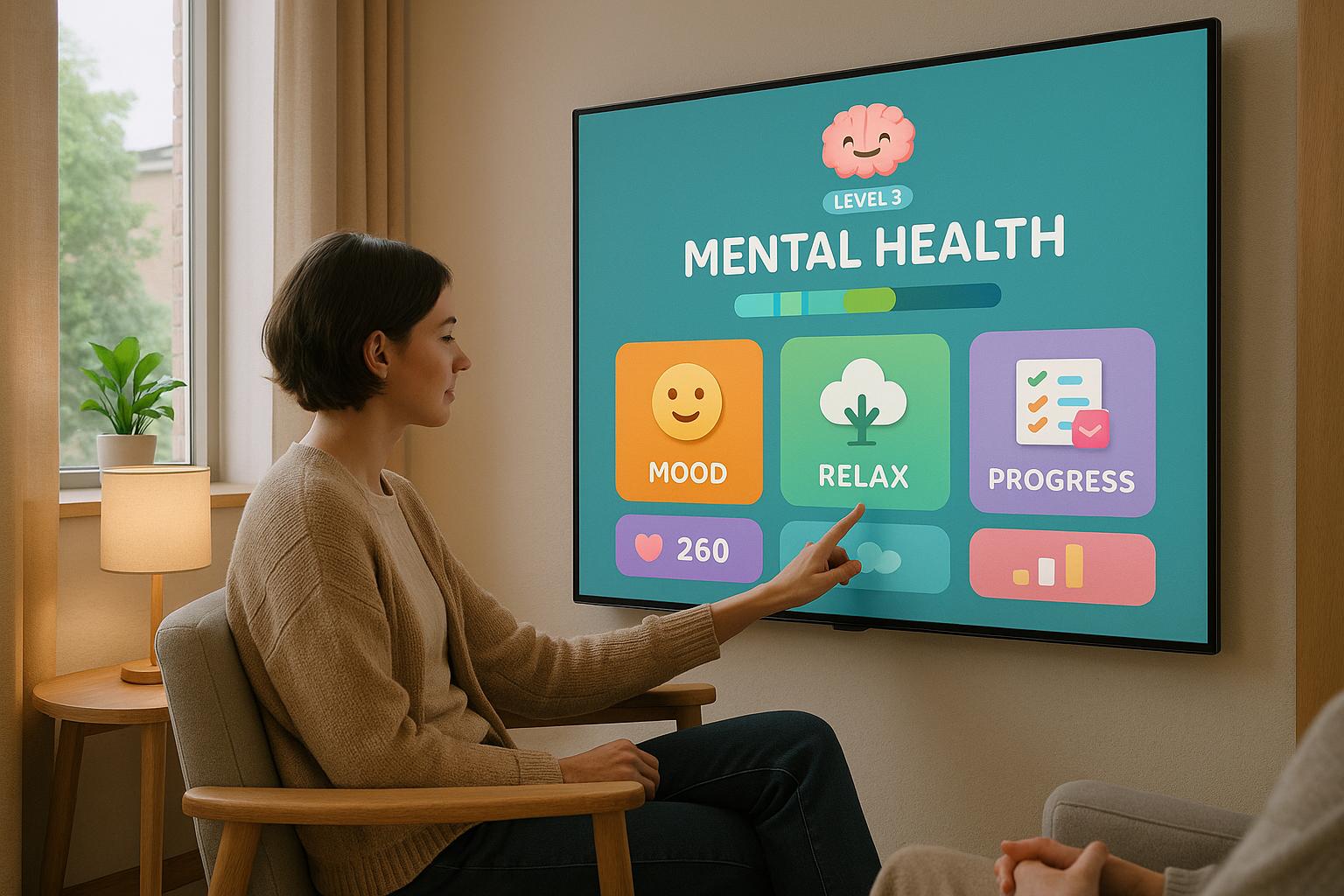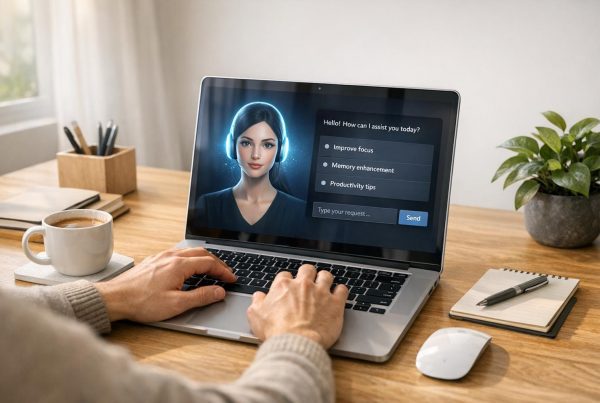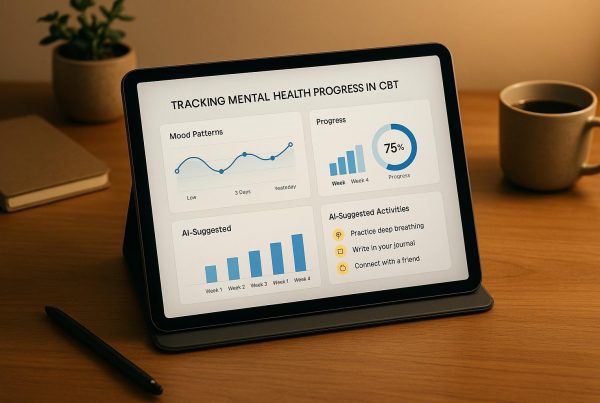Mental health care is being transformed by gamification and artificial intelligence (AI). These tools make therapy more engaging, accessible, and personalized for people of all ages. Here’s what you need to know:
- Gamification: Mental health apps now use game-like features such as rewards, challenges, and progress tracking to keep users engaged. For example, apps with gamified elements see up to a 65% higher retention rate.
- AI in Mental Health: AI systems analyze data like speech patterns and mood to deliver tailored therapy. They’re accessible 24/7 and can reduce therapy costs by up to 80%.
- Combined Impact: Together, gamification and AI improve user engagement and outcomes, with studies showing a 15–20% improvement in mental health results.
While these technologies bring promise, challenges like privacy concerns and sustained engagement remain. Still, their growth is undeniable, with the gamification market expected to hit $30.7 billion by 2025.
Gamification and AI are reshaping how mental health care is delivered – making it more interactive, affordable, and effective.
HOW GAMIFICATION TURNED OUT TO BE THE KEY TO MENTAL HEALTH
1. Mental Health Games and Apps
Blending gaming elements into mental health apps has changed how people engage with therapeutic tools. In fact, the healthcare gamification market, which was valued at over $10 million in 2022, is expected to skyrocket to $2.9 billion by 2032 [7]. This growth reflects the rising acknowledgment of its potential.
Interactive Engagement
Mental health apps that incorporate game-like features – such as achievement systems, rewards, and challenges – are proving to be incredibly effective at keeping users involved [5]. Take the Mentalis Phönix app, for example. Designed to help manage depressive symptoms, it boasts an impressive 93% retention rate, thanks to its gamified approach [3].
"Gamification offers a unique approach to addressing mental health issues with interventions incorporating game-like elements into non-game contexts. The interactive and immersive nature of gaming can captivate users, turning the experience into an enjoyable and rewarding journey." – Carter Do and Thomas Pak, MD, PhD [6]
The numbers back this up. Apps using these interactive strategies have shown:
- A 41% increase in user interaction compared to traditional methods [8]
- A 65% higher likelihood of continued use when features like mood tracking are included [8]
- A 60% boost in engagement through personalized digital therapy programs [8]
Personalization and Progress Tracking
Tailoring these apps to individual needs makes them even more effective. Apps that offer personalized feedback have demonstrated 40% higher retention rates [8].
| Key Feature | Impact on User Experience |
|---|---|
| Real-time Progress Tracking | Provides instant feedback and boosts motivation |
| Personalized Challenges | Adjusts difficulty to match user capabilities |
| Achievement Systems | Sets clear goals and celebrates milestones |
| Community Integration | Builds support networks and shared experiences |
2. AI Mental Health Support Systems (e.g., Aidx.ai)

Gamification might capture attention, but AI takes things a step further by delivering personalized, precise mental health support. It’s reshaping how people access therapy, making care more responsive and tailored to individual needs.
Data-Driven Personalization
AI platforms dig deep into various data points – like speech patterns, social media behavior, and even physiological data – to detect shifts in mood and adjust support accordingly [2]. These algorithms craft treatment plans that consider everything from genetic predispositions to past therapeutic responses, offering care that evolves in real time [4].
"It is truly game changing and will shake the industry very quickly."
– Salvija, Abuse Expert and Clinical Hypnotherapist [9]
Accessibility and Engagement
Access to therapy is a significant challenge – half of those seeking help struggle to find available practitioners [9]. AI steps in to bridge this gap by offering therapy options that are not only more accessible but also far more affordable, with costs typically slashed by 80% compared to traditional sessions [9].
| Feature | Impact |
|---|---|
| 24/7 Availability | Immediate support during critical moments |
| Cost-Effectiveness | Therapy at roughly 80% less cost than in-person sessions |
| Gender Engagement | Men are three times more likely to engage with AI therapy |
| User Acceptance | 75% of users are open to AI-driven mental health support |
AI doesn’t just increase accessibility; it also enhances the therapeutic experience with smarter algorithms that refine care delivery.
Advanced Therapeutic Intelligence
Platforms like Aidx.ai’s ATI integrate proven therapeutic approaches – such as Cognitive Behavioral Therapy (CBT), Dialectical Behavioral Therapy (DBT), and Neuro-Linguistic Programming (NLP) – to deliver adaptable, evidence-based support [9][10].
Real-World Applications
AI tools are capable of analyzing facial expressions and voice cues to provide real-time emotional insights. This data feeds into a personalized treatment plan, creating a dynamic and evolving therapeutic process [4].
"Aidx has been surprisingly human in identifying problems & asking the right questions. But faster! I got sucked into the conversation like I was talking to an educated & empathetic therapist & every suggestion sent me to where I needed to go."
– Hali, Strength & Mobility Coach [9]
Smart Monitoring and Support
One of AI’s strengths lies in its ability to recognize patterns and predict outcomes. By analyzing user behavior and assessment data, these systems can identify individuals at risk of developing mental health issues. For example, when stress levels spike or sleep patterns become irregular, the system can proactively suggest interventions [4].
sbb-itb-d5e73b4
Benefits and Limitations
Gamification and AI bring both promising opportunities and notable challenges to mental health care.
Powerful Synergies
When combined, gamification and AI create a dynamic approach to mental health support. Gamification boosts engagement through interactive and rewarding elements, while AI enhances precision by tailoring experiences to individual needs. EY’s research highlights that patients using gamified health apps experienced a 15–20% improvement in health-related outcomes compared to traditional methods [14].
Engagement and Accessibility
The blend of gamification and AI opens doors for individuals who may shy away from conventional mental health care. Deloitte reports that 42% of U.S. consumers actively use tools to monitor fitness and track health goals, indicating a growing acceptance of tech-driven health solutions [14].
| Aspect | Benefits | Limitations |
|---|---|---|
| User Engagement | 75% report improved well-being within 6 months [13] | Only 29% maintain engagement after the first month [13] |
| Personalization | Real-time adaptation to user needs | 59% of professionals cite a one-size-fits-all limitation [13] |
| Treatment Efficacy | 31% increase in emotional well-being [13] | 50% of companies struggle with efficacy measurement [13] |
Implementation Challenges
Despite its potential, implementing gamification and AI in mental health care comes with hurdles. Data privacy and security are critical, requiring compliance with HIPAA and the use of strong encryption to safeguard user information [1]. Overuse of these tools can lead to stress, privacy concerns, social fatigue, and even burnout [12]. Still, research consistently supports the effectiveness of this integrated approach, showing its ability to deliver measurable therapeutic benefits.
Evidence-Based Success
Studies confirm that combining AI with gamification provides meaningful therapeutic experiences while maintaining clinical standards. As these methods continue to evolve, they create new possibilities for refining mental health solutions.
Future-Focused Solutions
The gamification market is projected to reach $30.7 billion by 2025 [13], paving the way for more advanced integration strategies, such as:
- Adaptive difficulty levels for cognitive exercises
- Real-time monitoring of emotional responses
- Tailored therapeutic pathways
- Seamless integration with telehealth platforms [11]
Striking the right balance between user engagement, therapeutic impact, and strict privacy measures will be crucial. This ongoing evolution highlights the growing synergy between gamification and AI, shaping the future of mental health care.
Looking Forward
The combination of gamification and AI in mental health care is gaining momentum, with the mental health app market projected to surpass $5 billion by 2030, growing at an impressive 17% annual rate [16].
Emerging Technologies
New technologies are pushing the boundaries of what these tools can achieve. Take MindLight, for example – it uses neurofeedback, letting players control game environments with their emotional states. This approach helps users learn to manage anxiety through immersive gameplay [11]. Meanwhile, apps like Wellapets turn treatment adherence into a game, where caring for virtual pets mirrors managing chronic health conditions [11].
Enhanced Personalization
AI continues to refine personalization, bringing more precise and effective tools into mental health care. Here’s how:
| Advancement | Impact |
|---|---|
| Real-time Emotional Analysis | Reduces anxiety and depression symptoms by 50% [15] |
| Adaptive Difficulty Systems | Boosts session engagement by 60% [16] |
| Personalized Treatment Paths | Cuts user dropout rates by up to 40% [16] |
These innovations are transforming how mental health care is delivered, making it more engaging and tailored to individual needs.
Innovation in Delivery
The rapid growth of cloud gaming – 62.5% annually [1] – is opening up fresh opportunities for delivering therapeutic content. Platforms like MindBloom are leading the way, blending daily mental health exercises with virtual growth metaphors. This approach makes progress feel tangible and rewarding, helping users stay motivated [11].
Ethical Considerations
As these technologies evolve, addressing ethical concerns is critical. Initiatives like the FDA’s Digital Health Plan and President Biden’s executive order on AI provide frameworks to ensure that privacy and security remain top priorities [1].
The ongoing integration of AI and gamification is reshaping mental health care, offering more engaging and accessible support options. With a focus on ethical development and technological progress, these tools have the potential to make a meaningful difference in mental wellness and personal growth.
FAQs
How do gamification and AI combine to improve mental health support?
Gamification and AI: A New Approach to Mental Health Support
Combining gamification with AI is transforming how mental health support is delivered, making it more engaging and tailored to individual needs. Gamification introduces game-like features – think rewards, challenges, and progress tracking – that help users stay motivated and committed to their mental health goals. By turning therapeutic activities into something enjoyable, it encourages positive emotional engagement and a sense of accomplishment.
AI takes this a step further by analyzing user data to craft personalized experiences. It can tweak game scenarios, offer customized feedback, and adjust interventions to suit each person’s unique needs. This dynamic pairing of gamification and AI creates a more interactive and supportive space, helping users stay on track and achieve better mental health outcomes. Together, they make the process not only effective but also genuinely engaging.
What privacy risks come with using AI and gamification in mental health apps, and how are they being managed?
AI and gamification in mental health apps bring up serious privacy concerns, especially when it comes to handling sensitive personal information. Mental health data, in particular, could be vulnerable to breaches or unauthorized access if not properly protected.
To tackle these challenges, many app developers are stepping up their security game. Measures like data encryption and anonymization are being implemented to safeguard user information. For apps dealing with health data, meeting regulations like HIPAA has become a priority. Beyond technical solutions, educating users about privacy policies and how their data is managed is crucial. This not only helps build trust but also ensures users give informed consent when using these apps.
How do AI-powered mental health apps personalize support for each user?
AI-driven mental health apps offer personalized support by analyzing various data points, including user behavior, personal history, and external factors. Through advanced machine learning, these apps can detect patterns and adjust therapeutic strategies to fit individual needs. For instance, they might identify early signs of stress, anxiety, or depression by examining factors like activity levels or communication habits.
This personalized approach not only boosts user engagement but also ensures the support aligns closely with each person’s unique challenges and goals, making mental health care more effective. By continuously evolving based on user feedback and interactions, these tools create a dynamic, tailored path for personal growth.



